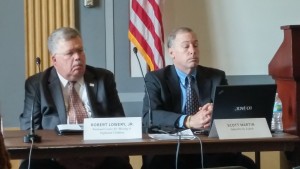 By Lisa Wiederlight, executive director, SafeMinds
By Lisa Wiederlight, executive director, SafeMinds
One of the most urgent problems facing the autism community is that of wandering and elopement, which is a primary cause of mortality associated with an autism diagnosis. Heartbreaking stories of missing children and adults appear on our newsfeed each week. Recognizing that safe minds require safe bodies, SafeMinds is supporting effective interventions for the sometimes lethal comorbidities of autism by working to obtain support for Avonte’s Law Act of 2015/S.163, increasing awareness of the wandering and elopement issue, and educating law enforcement organizations.
Avonte’s Law is named after Avonte Oquendo, a 14 year-old boy with autism who wandered from a New York City school in 2013. His body was later
found in the East River after an extensive search. Since Avonte’s death, many, many more children have eloped, and some have suffered the same fate as Avonte himself. Just imagine what parents must endure realizing that they have no idea where their child went hour after hour, day after day—nonverbal, scared, and alone. So let’s get to some solutions.
The bill authorizes $50 million over five years to reduce the risk of injury and death due to wandering, and to safeguard individuals with disabilities during interactions with law enforcement. We are asking for $50 million over five years from the federal budget. On the front of my high school is etched in stone, “Life is to Rise, and Not to Rest.” The autism community must take action now—mothers, fathers, siblings, grandparents, guardians, teachers, paraprofessionals, therapist, doctors—and demand that our children’s public safety needs are supported. We must rise to this challenge and make the call– calling your Senators and asking them to co-sponsor S.163 could make the difference in their decision to support it. Your call matters.
Given my life experience as a mother of a child with autism, and my extensive prior involvement in law enforcement administration, I realized that Avonte’s Law presents a unique opportunity for bringing the autism and public safety communities together so that our children are more secure. Accordingly, I contacted Lori McIlwain and Wendy Fournier of the National Autism Association (NAA), who have worked tirelessly on this issue, so that our organizations might give Avonte’s Law the momentum it needs to pass in both the Senate and House. When SafeMinds and NAA began working together, something amazing happened—more autism and other disability groups joined us. More on that later!
 One of the methods we have used to increase awareness is a congressional briefing. On May 19, autism and missing person experts presented a briefing on Capitol Hill that addressed wandering and elopement in children and adults with autism. The audience included congressional representatives, law enforcement officers, and members of the autism community, among others. The office of U.S. Senator Chuck Schumer (D-NY) sponsored the event, with the National Autism Association (NAA) as its host. In a virtually-unprecedented, much-welcomed, and much-needed show of solidarity, the event was coordinated by NAA, SafeMinds, Autism Speaks, The Arc, and Autism Society.
One of the methods we have used to increase awareness is a congressional briefing. On May 19, autism and missing person experts presented a briefing on Capitol Hill that addressed wandering and elopement in children and adults with autism. The audience included congressional representatives, law enforcement officers, and members of the autism community, among others. The office of U.S. Senator Chuck Schumer (D-NY) sponsored the event, with the National Autism Association (NAA) as its host. In a virtually-unprecedented, much-welcomed, and much-needed show of solidarity, the event was coordinated by NAA, SafeMinds, Autism Speaks, The Arc, and Autism Society.
Presenters included Lori McIlwain, board chair of NAA; Scott Badesch, president/CEO of Autism Society; Bob Lowery of the National Center for Missing and Exploited Children; Lindsay Naeder, director of Autism Speaks’ Autism Response Team; and Scott Martin of the SafetyNet division of Lojack. Amanda Burstein of the International Association of Chiefs of Police spoke briefly at the end of the event to propose the idea of using a law enforcement training model for autism that is similar to that which is used for the Alzheimer’s community.
During the briefing, the presenters defined the problem—specifically that, according to a 2012 article in the journal Pediatrics, almost half of those diagnosed with autism will wander for safe environments. NAA’s data show that 15 percent of all autism related wandering cases in recent years have resulted in death. The experts also described several solutions, including parent education, community outreach between police and families facing autism, and the voluntary use of locator technology.
SafeMinds is now working to educate congressional staff members, national law enforcement organizations, the news media, and other stakeholders to gain support for the bill and a greater understanding of the autism community’s public safety needs. We need to put a full-press on Washington, D.C. right now! If you can’t be there to join us, please make the call. Let’s RISE together.
More information on the wandering issue and resources for addressing it can be found on SafeMinds’ website, here.
![]() This SafeMinds initiative is part of our Policy and Justice Program. If you’d like to help, please donate to our Policy and Justice Fund.
This SafeMinds initiative is part of our Policy and Justice Program. If you’d like to help, please donate to our Policy and Justice Fund.
![]()


